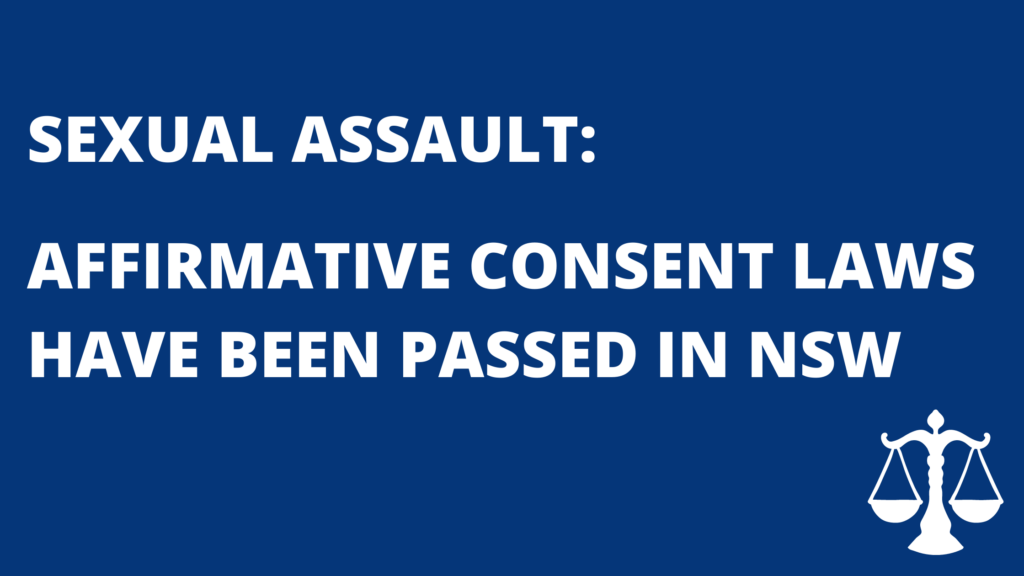On 23 November 2021, NSW Parliament passed an Affirmative Consent Bill, marking a major overhaul in the state’s sexual consent laws. The affirmative consent model is generally designed to overcome a common hurdle in sexual assault trials- that an alleged offender had reasonable grounds for believing the complainant had consented.
What this means
Under previous NSW law, a person commits sexual assault if they know the other person is not consenting, if they are “reckless to whether” they consent, or if there are no reasonable grounds for believing there was consent.
The new laws require a person to show they took active steps to find out if a person consented to sexual activity. Sexual activity must be communicated by words or actions, not simply assumed.
An accused person’s belief in consent will not be reasonable in the circumstances unless they said or did something to ascertain consent.
The Attorney-General has stated that these changes are not intended to “require a written agreement or script or stifle spontaneity.” What it does require is that if you wish to engage in sexual activity with someone, then you need to do or say something to find out if they want to engage with you too.
What will change in Court proceedings?
The definition of consent being a free and voluntary agreement to sexual activity will remain the same while adding that it must be present when sex occurs.
Further clarification will be given to the definitions of “sexual intercourse”, “sexual touching” and “sexual act” in the Crimes Act 1900 (NSW).
An explanation will be given on a person’s right to withdraw consent at any point and that consenting to one sexual act it does not mean that they have consented to other sexual acts.
The amendments will clarify that a defendant cannot rely on self-induced intoxication to show they were mistaken about consent.
The reforms will include five directions that can be given to juries in sexual offence cases to address common sexual assault misconceptions. It will also provide education programs for judges, legal practitioners, and police on how to best navigate victims of sexual assault through the judicial process.
Key Takeaways
- NSW Parliament passed the Affirmative Consent Bill on 23 November 2021, revising sexual consent laws to require active steps for consent verification.
- The law mandates clear communication through actions or words for sexual activity consent, challenging assumptions of agreement.
- Legal definitions of sexual activities were clarified, emphasizing continuous consent and the right to withdraw at any stage.
- Intoxication cannot be used as a defense for mistaken consent under the new laws.
- These reforms aim to address misconceptions in sexual assault cases, supported by educational programs for legal and police personnel.
R v Lazarus [2017] NSWCCA 279
These changes came into place as a result of a review by the NSW Law Reform Commission after the trial of Mr Lazarus. Mr Lazarus was convicted and then acquitted, of a sexual assault concerning an incident that occurred outside of a Kings Cross nightclub. The appeals in this matter brought into question the definition of consent and how the courts determine consent in sexual assault trials.
At his first trial, Mr Lazarus was found guilty, overturned the matter on appeal, and was then found not guilty during a retrial when it was found that he held a “genuine belief” that the other party had consented. That ruling was later overturned but the Court of Criminal Appeal did not order another trial.
To read more about this trial, view R v Lazarus [2017] NSWCCA 279.
If you or someone you know needs legal advice or representation for a criminal or traffic law matter, contact the team at Hamilton Janke Lawyers 24/7 by calling 4038 1666.
Written By

Drew Hamilton
Drew Hamilton is founding partner at Hamilton Janke Lawyers. Admitted to the Supreme Court of New South Wales as a Solicitor and also listed on the High Court of Australia register.




